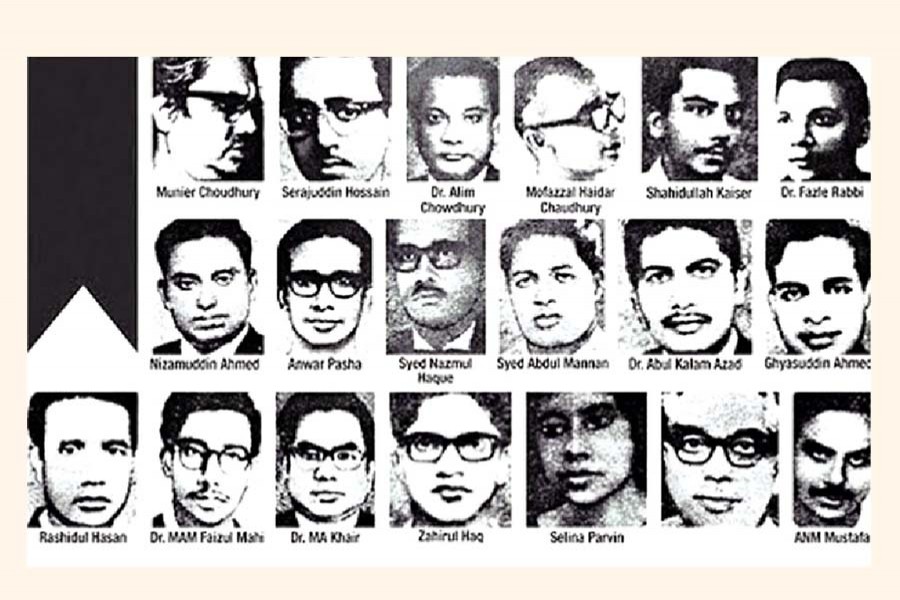
The 1971 killing of intellectuals
SHIHAB SARKAR | Monday, 13 December 2021

The Pakistan occupation army's brutality in 1971has long found a permanent place in the annals of global war history. Due to the genocide they unleashed on the innocent Bengalees, they had already earned worldwide condemnation and censure. Unfortunately, they kept adding to this grim record. In the last daysof the Liberation War, the air of Dhaka was thick with a number of dark speculations. The most chilling of them was the one which said before surrender, the occupation army would kill people indiscriminately by storming residences. Finally, they dropped the plan fearing global repercussions. It was during this stage, at the start of the second week of December, the army command hit upon the idea of killing intellectuals secretly. As they had supposedly thought, these acts would not receive international press coverage. It proved wrong. Many in Pakistan had later, after its ignoble surrender to the then Joint Forces, singularly blamed the army's war strategists for designing the plan of Bengalee intellectual killing in occupied Bangladesh.
The Pakistan state in 1948 didn't bother to comprehend the distinctive identity of the Bengalees and their evolution through centuries. They remained comfortably oblivious to these facts. The then-central government politicians had to pay heavily for this. Bangla was recognised as Pakistan's one of the two state languages. But the great damage inflicted on the dream of Pakistan surfaced in the form of the seeds of mistrust sown between the two wings. The Language Movement and its bloodied suppression played the role of catalyst. The centre-based ruling clique failed to understand that the people comprising Pakistan's eastern wing carried the legacy of over a thousand-year-old Bangla language and culture.
By executing the Bengalee intellectual killing plan between December 11 and 14 in 1971, they had repeated the same old blunder. They grossly undermined and misread the Bengalee nation. They had thought despite their humiliating defeat in the Liberation War, they could now draw a triumphal pleasure and satisfaction from the killing of a vast section of Bengalee intelligentsia. The macabre spree of intellectual killing was not limited to Dhaka. Almost all the big cities, towns, and, even, a few developed villages, experienced the cold-blooded killings. The occupation army derived a morbidpleasure from these killing sagas. They thought that by killing the Bengalee intellectuals, they attained a great mission of theirs --- stopping the Bengalees from emerging again as an educated and enlightened nation. They were convinced that despite being an independent nation, Bangladesh would remain deprived of its intellectual wealth. And it would never come out of its limping state. The policymakers of the nearly vanquished army knew well about the role the intellectuals play in the proper growth of a nation.
Politicians help a people in coming free of subjugation and many other oppressive shackles. But the intellectuals and the creative people mould the soul of a new nation. They are behind defining the quintessential identity of emerging nations. Bangladesh was such a case. It's true that the loss of intellectuals in 1971 was irreparable. Yet the newly emerged nation kept marching forward. This is what Bangladesh has been doing in the last fifty years.
Carrying the legacy of the great Bengali thinkers, academics, authors, economists, scientists etc, the new generation of intellectuals have been filling the void created by the occupation forces in 1971. The ideas of these intellectuals that germinated in the free and sovereign state of Bangladesh are completely different from that nurtured by the earlier intellectuals. Now that the intellectuals and creative artistes take pride in being the citizens of an independent nation, they do not hesitate to discover themselves in an international perspective. Unlike their predecessors, they can think independently. Different kinds of bogeys in the Pakistan days that constrained the activities of the previous generations have long disappeared. No exercises of the intellect and creativity in a veritable police-state are comparable to those practised in a fully free country.
During World War-II, scores of German intellectuals, scientists and artistes had been made to flee their own country. They were desperately in search of countries offering a congenial atmosphere. Most of them fled to the USA. In their native land they had been hounded by the Nazi Gestapo, which would pick up the 'enemies' of the Nazi regime. Hitler's invasion of France and occupation of the country for four longyears led to the creation of the French resistance forces. The underground army included many philosophers and authors. They brought out anti-Nazi newspapers and bulletins for the French people under siege. Had the Liberation War lasted longer, i.e. more than nine months, underground newspapers would have come out in every city and town in the occupied Bangladesh. However, the name of Dhaka has registered a prestigious place for its mustering the courage to bring out a fortnightly from a clandestine spot. Printed in cyclostyle method, the 4-page bulletin contained the latest developments in the Liberation War, exclusive news and views, and analyses, the war in international perspectives etc.
Seasoned journalists wrote those items. Some of them would send their write-ups from across the border through trusted couriers. A large number of the analytical write-ups would be prepared in Dhaka. The journalists and intellectuals based in the occupied city played a great role in preparing these items. All of them used pseudonyms while publishing the write-ups. Thanks to the ever-changing circumstances, the intellectuals before and after a national liberation war have to remain engaged in the whole episode as a Freedom Fighter. The war for Bangladesh’s independence was over 50 years ago. Isolated discourses on the nation's new directions followed it. Those would have been much enriched in content with the presence of the intellectuals martyred in December.